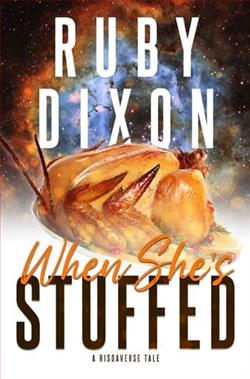Page 33 of The Someday Daughter
“‘Mailbox Station’?” Mick rights himself in his seat, turning back to her. “I’m not sold so far, Clementine.”
“Don’t call me that,” she says, pointing a finger at him. “And please hold your judgment until we’re fully on the premises.”
Cleo drives past a crop of dense trees, and when we round the corner we’re suddenly in a postage stamp of a parking lot with hundreds of mailboxes spread out in front of us. They’re all different colors, materials, eras. Our car is the only one in the lot, so Cleo pulls right up to the fence that separates the parking spaces from the field of mailboxes.
“Let’s go,” she says, throwing the van into park. “To Sadie’s point, we don’t have all day. Also, someone else is driving when we’re done here.”
We pile out of the van and Silas takes Puddles from Mick, hurrying ahead of us as she drags him over to a patch of grass. The rest of us cluster at the entrance of Mailbox Station, where a plasticbox with a clear lid sits full of notepaper and envelopes. A golden plaque on its front readsTake what you need so you can leave what you need.And next to it, a sign with a lockbox attached:Lovingly maintained by our amazing volunteers.Mick digs in his pockets, dropping in a few quarters, and Cleo says, “Do they have a credit card reader or what?”
Mick snorts and drags her into the rows of mailboxes as Sadie pulls a ten out of her wallet and sticks it in the lockbox.
“Shall we?” She motions me ahead of her, so I step into the labyrinth and duck to look into a mailbox. Some of them have stacks of letters inside, some are empty, some house just one lonely note. They’re all splashed with different handwriting:
For Max
To Adeline, wherever you are
To Daddy—miss you
I look around, breathing in the heat. There’s something reverent about the air out here, moving through all these left-behind words.
“There are no addresses,” I say, almost to myself.
“I think that’s probably the point.” Sadie looks over at me, a few mailboxes ahead. “Things you wish you’d be brave enough to say for real, you know? Or what you’d say to someone who can’t hear it. Someone who’s gone.”
Mick and Cleo are far away now, peering into a set of retro red mailboxes side by side. I spot Silas by the parking lot, pulling a piece of paper out of the box with Puddles panting at his feet.
I look at Sadie and find her watching him, too. She smiles at me, and I wonder if we’re thinking about the same thing: Silas, and what he’d say to someone who’s gone.
“Elliott would love this,” she tells me, resting her hands on her hips and turning in a circle to take it all in. “He’s obsessed with the mail service, ever since we brought him home. We wait on the porch to say hi every single afternoon.”
“Brought him home?” I ask.
Sadie looks at me, eyes hidden by the reflection off her sunglasses. “He was eighteen months old when we adopted him.”
“How old is he now?”
“He was three in May,” she says, smiling. “And wilder by the day.”
I reach for the mailbox closest to me, lift its metal flag skyward and then tuck it back into place. “You miss him?”
“Oh, constantly,” Sadie laughs. “It’s like being hungry for your favorite food, but only the way your favorite restaurant makes it, and they’re closed all week. So you eat something else, and it fills you up, but it’s not the same.”
Across the field from us, Silas is licking the seal of an envelope and pressing it carefully closed. I think of my first year at the Summit School, the few futile letters I mailed to my mother. They were assignments—we practiced narrative writing by drafting handwritten notes to our parents. The language arts teacher made a big show of passing around stamps, of collecting the envelopes and stacking them neatly in a box for transport to the post office. I sent Camilla long, rambly messages about my days: about my new roommate, Fallon, and the spaghetti in the dining hall, and the way fresh snow made everything unnaturally quiet. I imagined her reading the letters in her great, sloping yard, overlooking the ocean. Missing me. The responses came weeks, sometimes months, afterward—unsigned Hallmark cards, my name andschool address inked in Magnolia’s handwriting.
Silas starts across the field with Puddles and I look away from him, down at the grass. My cheeks burn with the memory: how desperately I’d reached out for my mother, and how transparently she didn’t care.
“Hey, listen,” Sadie says. I blink, looking up at her. “You did really great in Austin, with Dr. Kowalski.” I fidget under the praise; all I’ve ever wanted is to impress people, but I never know how to behave when they tell me I’ve done it. “I was talking to Camilla about it, and we think you should share more about your work this summer, during your appearances with her. Let people get to know you for what you’re so great at.” She watches me, trying to gauge my reaction. “If that’s something you’d be interested in.”
“My mom thinks that?” It comes out of me without any processing at all; I speak the words in the same moment they occur to me. It doesn’t make sense that my mother would want me to talk about this—my visits with doctors, my time with Sadie, the one part of this summer that’s not about Camilla. And since when do she and Sadie talk about me, anyways?
“We both do,” Sadie says slowly. She studies me for a beat, then adds, “At least consider it, okay? This tour is about both of you—you should get to share your experience, too, if it’s something you want.”
A butterfly flits past, and I watch the shudder of its wings in the thick July heat. It is something I want, isn’t it? To be known for who I am, apart from her.
“Either way,” Sadie says, starting to move back toward the car, “tomorrow will be great. Dr. Bautista was actuallymyphysical therapist when I was doing my postdoc—he was on rotation inMichigan and I swear he saved my back after so much nonstop standing in the lab....”
I let the rest of her sentence melt into the shimmering heat, into all the other words swirling between us in this place. Separated from us by rows of metal flags and letters, Silas has stopped in front of a wood-paneled, white-painted mailbox. He looks down at the envelope in his hands, balanced in both palms like something precious and breakable. Puddles waits patiently in the grass, like even she knows to give him time. And then he slides the letter into the box and lifts the little red flag.















